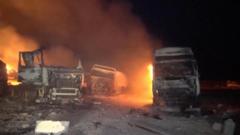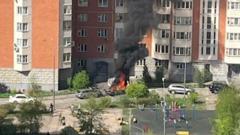A recent bombing in South Sudan has left at least seven dead and multiple injured, drawing condemnation from humanitarian organizations and reigniting fears of a return to civil war amid escalating tensions between political leaders.
Tragic Bombing in South Sudan Claims Lives and Sparks Humanitarian Outcry

Tragic Bombing in South Sudan Claims Lives and Sparks Humanitarian Outcry
Seven casualties reported after bombing of hospital and market in Jonglei state, exacerbating fears of renewed civil conflict.
In a devastating incident in South Sudan, a hospital and market were targeted in a recent bombing that has resulted in the deaths of at least seven individuals, as reported by the medical charity Doctors Without Borders (MSF). The attack, which took place in Old Fangak, Jonglei state, involved helicopter gunships that dropped bombs on both the pharmacy of the hospital operated by MSF and subsequently fired upon the town for an extended period. Additionally, drone strikes targeted a local market, contributing to the chaos.
MSF emphasized that the hospital functions as the sole medical facility for Fangak county, serving a population exceeding 110,000, and lamented the total loss of all medical supplies due to the bombing. The charity categorized the assault as a "clear violation of international humanitarian law" and reported that 20 individuals sustained injuries as a result of the attacks.
The situation has raised alarm as Nicholas Haysom, the head of the UN mission in South Sudan, indicated that the country is on the verge of sliding back into full-scale civil war. The escalating tensions arise from an ongoing feud between President Salva Kiir and Vice-President Riek Machar, further compounded by army threats of retaliation following river barge hijackings attributed to a militia linked to Machar.
Machar's previous arrest in March, along with his aides on accusations of inciting rebellion, has heightened political tensions. Areas labeled as hostile by the government further exacerbate concerns about renewed violence along ethnic lines, reminiscent of the devastating civil war that began two years after South Sudan's independence in 2011.
Although a peace agreement was signed in 2018, and a unity government established, the expected elections have yet to materialize, and the disbandment of militias has not occurred. The recent revival of armed confrontations, including clashes involving the White Army militia, has not only rattled the fragile peace but has also raised urgent calls from rights advocates for the military to cease its attacks against civilian populations.






















